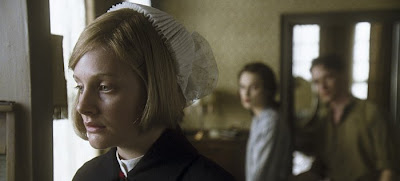
Atonement was nominated for seven Golden Globes today, so now is as good a time as any to quote this interesting — and semi-spoiler-ish — comment on the film that Brian D. Johnson of Maclean’s magazine made at his blog last week:
Although I’m not exactly the most ardent reader (I’ve lost the habit to movies), I’m a huge fan of Ian McEwan. I’ve read every word he’s published. And we all know how easy it is to find fault with movies based on books you love. But Brit director Joe Wright (Pride & Prejudice) and screenwriter Christopher Hampton (Dangerous Liaisons) adapt McEwan’s novel with a lush, eloquent drama that is admirably faithful to the original—even if its emphatic tone, which pushed into melodrama, lacks McEwan’s subtle touch. With his book, McEwan pulled off the considerable feat of writing in a woman’s voice. (One of the novel’s final twists is that the book we have been reading has been written, as an act of atonement, by the older, wiser Briony.) But this movie feels like it was directed by a man (which it was), and it recalls the opulent style of British period epics by the likes of David Lean and Merchant Ivory. The film’s most effective sequences were the most girlish, Bronte-like ones—all that devilish intrigue in and around the country manor. Once we get to the war, it seems that Wright is on a manly mission to show off, especially with a five-and-a-half minute continuous shot that wends its way through a surreal pageant of horror on the beach at Dunkirk.
Interestingly, Johnson ends his review by drawing comparisons between Atonement and Anthony Minghella’s The English Patient (1996) — but he neglects to mention that Minghella himself appears in one of Atonement‘s final scenes!












